How To Donate Blood To Ukraine
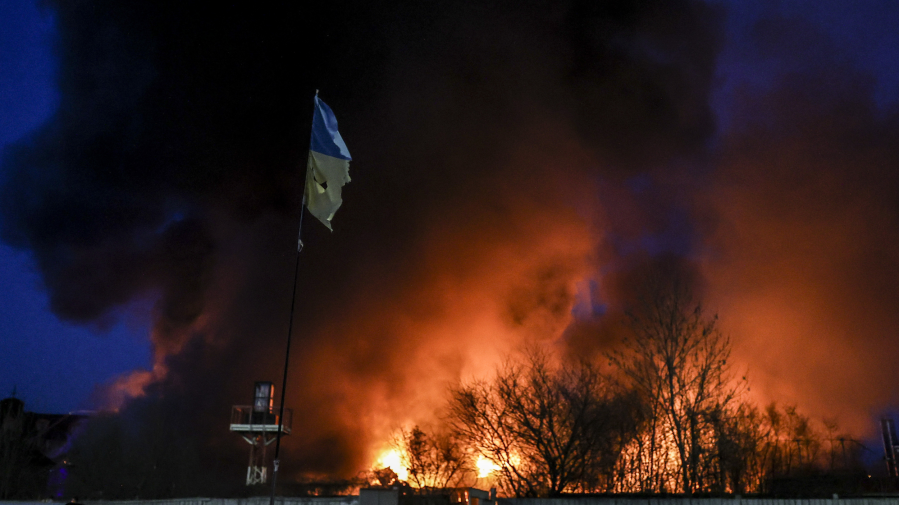
Since the early hours of February 24 marked the beginning of Russia's full-scale invasion of Ukraine and Europe'due south beginning major state of war in decades, the earth has watched equally explosions have reverberated across Ukraine'south uppercase and, eventually, other highly populated cities. In just over a month, the war in Ukraine saw over five meg refugees flee to other countries and another 7 one thousand thousand become internally displaced inside Ukrainian borders. Between February 24 and May iii, three,193 civilians were killed and some other 3,353 were injured.
Across efforts to finish the war focusing on saving lives and preventing further direct humanitarian devastation, another silent victim of the country's burdensome new reality could continue harming Ukrainian communities long subsequently the last Russian troops have left: the natural environment.
With every missile explosion, raging fire and edifice plummet, high concentrations of pollutants are existence released to permeate the country'south water supply, soil and atmosphere. Apart from the environmental consequences of harmful heavy metals, fine particulate matter and toxic gas, experts affirm that these pollutants tin can besides raise the risk of cancers, developmental disorders and cardiovascular disease in people.
Ecoaction, a Ukrainian ecology advocacy group, recorded nearly 150 ecology crimes committed by Russian federation in the starting time 47 days of the invasion. "Crimes against the surroundings are not simply almost nature, it's about people," said Ecoaction's head of environmental crimes Yevhenia Zasyadko in a press release. "This war can cause many deaths in the future due to polluted water. We tape soil pollution and mining of our fields. Food security and our fertile soils are in great danger caused by the deportment of the occupiers."
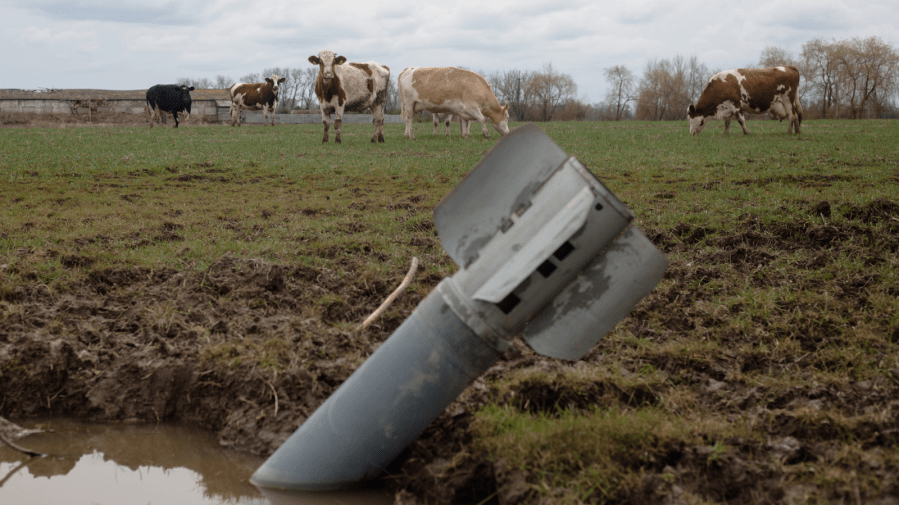
History Can Tell Us How War Affects the Environment
Possibly the most infamous instance of war'south negative impact on the environment happened during the Vietnam War, when U.S. forces covered 4.five million acres of rainforest and wetlands with "tactical" herbicides, including one known as Agent Orange. These highly toxic dioxins — persistent organic pollutants that intermission downwards in the natural environment very slowly — continue to contaminate soil, h2o, aquatic species and the local nutrient supply in Vietnam more than than fifty years later on.
Research on by conflicts suggests that wars can atomic number 82 to pregnant losses in biodiversity and impede conservation activities to cause irreversible ecology damage. According to a 2018 study, armed conflict is direct correlated with declines in wild animals across even protected parts of Africa. In Mozambique, where civil state of war from 1977 to 1992 destroyed 90% of Gorongosa National Park'south wild elephant population equally both sides poached ivory to finance the war, the species actually evolved to lose their tusks as information technology gave them a higher chance of survival. In addition to their cultural significance, African elephants play a crucial part in maintaining found populations and balancing natural ecosystems inside their range.
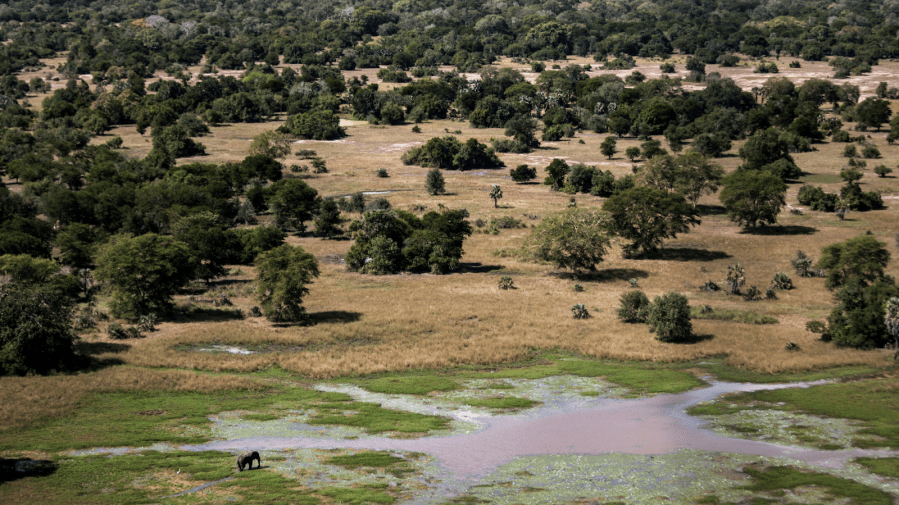
Environmental stressors caused by state of war, such every bit country degradation, pollution, floods and lack of access to clean water, tin can exacerbate tensions and lead to further conflict and competition over precious resource — in fact, studies show that conflicts over water within countries and between countries are already increasing worldwide. Likewise, wars typically result in nutrient shortages and economic insecurity, oftentimes driving both civilians and armed forces to rely on natural resources, sensitive habitats and vulnerable wild fauna.
Widespread Pollution
Ukraine is a huge agricultural country with the potential to feed a large portion of the world. Of the country'south full land area of 60 million hectares, about 42 million are classified as agricultural country. The missiles, bombs and tanks that Russian federation brought onto Ukrainian soil are all filled with waste, delivering polluting contaminants to country ordinarily used for agricultural purposes. These pollutants don't only impact crop production now, but volition hinder future generations once it comes fourth dimension to rebuild.
Apart from what Russia is bringing into Ukraine, information technology's also necessary to consider the chemical plants, factory storage facilities, oil deposits, coal mines and gas lines that were already in that location. These industrial sites can release formidable levels of pollution if they're damaged. Similarly, the fires formed from missile strikes and other destructive activities have consequences that include air contamination and water runoff contamination.
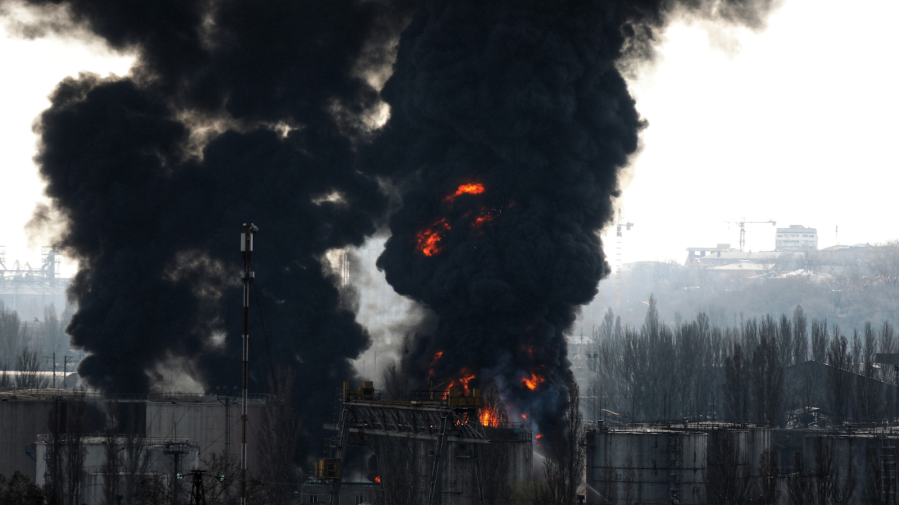
When Russia seized Chernobyl, the now-abandoned site of the worst nuclear disaster in world history, scientists and civilians alike waited with bated jiff equally soldiers dug trenches in the highly radioactive soil, flew jets over restricted airspace and took workers earnest at gunpoint. Impairment to these nuclear waste matter storage facilities could produce sizable radioactive contamination, locally and far beyond the site's borders. Russia'due south invasion also marked the starting time time in history that a nation'due south war strategy included occupying a nuclear institute, painting a grim picture of a future where every nuclear plant could exist used every bit a pre-installed nuclear bomb.
Threats to Biodiversity and Habitats
The Black Sea Biosphere Reserve, 1 of the largest nature reserves in the country, lies on the southern coast of Ukraine. A protected sanctuary for migrating birds and vulnerable species, over 700 types of flowering plants and 3,000 species of invertebrate animals have refuge in its 220,000 acres' worth of coastal waters and wetlands.
The territory of this UNESCO-designated reserve, at present occupied by Russian troops, has already suffered massive fires due to fighting virtually the city of Kherson. Information technology notwithstanding isn't clear how much of the habitats there have been destroyed by active battles and the weight of military machine vehicles encroaching over the mural, but the initial fires were large plenty to be detected from space.
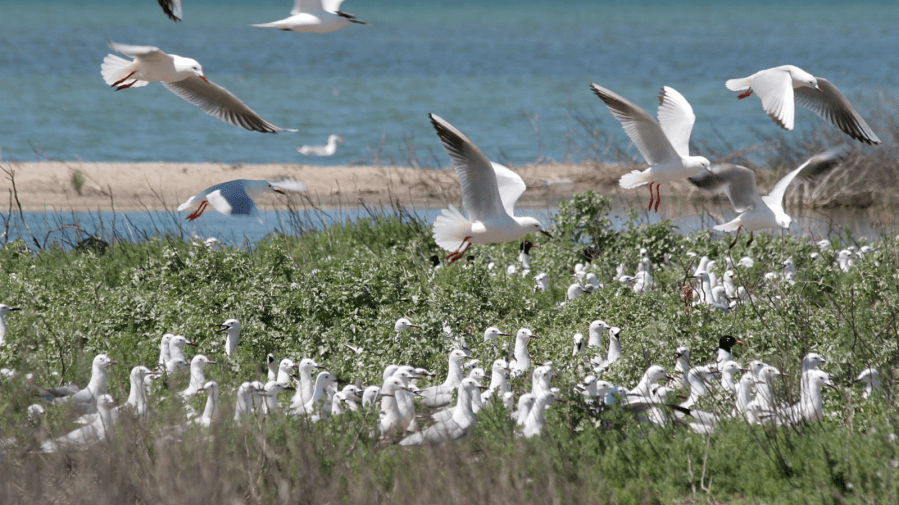
Increasing Deforestation Pressure
Ukraine is usually the world's biggest producer of sunflower oil, historically generating one-third of the globe's supply and accounting for near one-half of global exports. Sunflower oil has long been used in a broad range of food products every bit a replacement for palm oil, a major driver of deforestation in places similar the Amazon rainforest. Every bit the war causes exports to tank, some desperate companies are considering going dorsum to palm oil to maintain production.
The invasion has besides presented timber supply concatenation challenges for construction (Russia is the largest exporter of lumber and seventh biggest exporter of wood products worldwide), putting additional pressure on the illegal logging industry elsewhere. The Forest Stewardship Council, which provides the earth'southward leading certification procedure for sustainably sourced wood products, has as well suspended all trading certificates in Russia.
According to Ukraine's Ministry of Free energy and Environment Protection, over 1,500 Russian missiles had been launched at the country as of mid-April. Unabridged cities accept been destroyed and others take been severely damaged. Once the Ukrainian people begin to restore infrastructure mail service-war, most (if not all) of the construction materials volition be sourced from the country itself. A potential increase in wood, rock and other resource extraction could take an even farther cost on the already-damaged natural environment.
What the War Means for the Time to come of Environmental Research
It's no secret that war uses upward a tremendous amount of free energy. Moving troops and heavy equipment, planes and missiles — all have upwardly oil and fuel that emit greenhouse gasses equally they fire. Already, the war in Ukraine has risen global oil prices to historic levels, which in turn drives upwardly costs for consumer products like food, fertilizer and electronics.
As countries effectually the world reduce dependency on Russian imports, international collaborations between climate scientists are likewise feeling the tension. Russian federation controls a substantial portion of the Chill coastline and sea territory, where some of the world's most crucial research on carbon emissions also takes place. Now, this research has come to a detrimental pause as scientists terminate any scientific clan with Russian researchers.
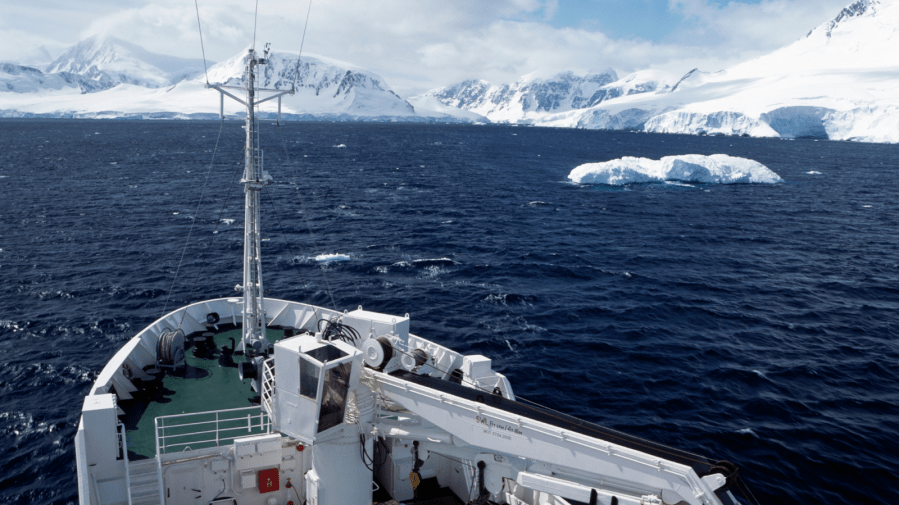
Russian scientists were also banned from the Arctic Scientific discipline Summit Week in Norway, an Arctic-enquiry meeting hosted past the International Arctic Scientific discipline Commission, responsible for coordinating international research in the Chill. Organizers for the event, Jørgen Berge and Geir Gotaas, told The Wall Street Periodical that, while they knew barring researchers from Russian organizations would complicate enquiry efforts, they felt that they needed to accept action in calorie-free of the conflict. "We are—as ever—strong supporters of scientific collaboration, simply in the current situation the scientific benefits of maintaining official links with Russian institutions are outweighed by the need to take a articulate stand against the actions of the Russian government," they said.
Just before the initial attacks, a global consortium of permafrost scientists was preparing to embark on a multi-yr, Arctic-wide monitoring effort that would have provided vital data on how the region is warming. Sue Natali, Chill programme managing director for the Woodwell Climate Research Center, told Time magazine that at least one-half of their piece of work would have taken place in the Russian portion of the Arctic. As the region is likewise warming four times faster than the rest of the globe, that data is nothing short of essential. "We cannot but ignore what is happening with permafrost in Russia," she said. "It's a massive blind spot."
Scientists who report permafrost (stone or soil that has remained frozen for at least two years) in the Arctic exercise and so in order to learn more than about the past climate and how frozen earth changes — and may proceed to change — over time. Information technology's difficult to say how the lack of shared information between Russian researchers and the rest of the scientific community will bear on the time to come of climate research, simply it certainly has the potential to fix it back.
Source: https://www.ask.com/culture/environmental-impact-war-in-ukraine?utm_content=params%3Ao%3D740004%26ad%3DdirN%26qo%3DserpIndex&ueid=9054d459-573b-4b4e-a1bb-74a0e230ae39

0 Response to "How To Donate Blood To Ukraine"
Post a Comment